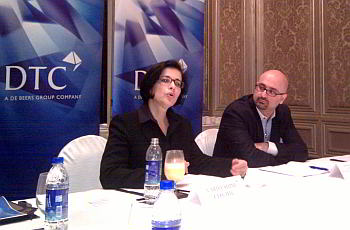System Allows New Sightholders Before 2015: Varda Shine
February 16, 12
 "People who don't do business in a fully transparent |
Shine was speaking with the press in Mumbai along with Mahiar Borhanjoo, DTC's executive director of sales and Sightholder services. She said that 90 percent of the DTC's rough supplies were allocated for distribution to Sightholders while the remainder was sold at auction through Diamdel.
If the DTC observed that Sightholders were not buying a certain category of goods and that someone was, however buying those same categories strongly through Diamdel, that person would be given a direct allocation of those goods in a Sight.
"We have only a fixed quantity of goods and we don't hold anything in inventory. So it is a matter of continuous monitoring and redistribution of rough supplies," Shine said.
Elaborating on this, she observed, "we have three major considerations in our selection of Sightholders: the first is the total availability of goods, followed by the specific requirements of a prospective Sightholder and finally an assessment of his performance.
"The availability of goods plays a significant role in that if, say 20 people ask for the same kind of goods and we only have enough for six, then automatically, number seven onwards can't be Sightholders. There are good manufacturers who haven't got Sights simply because of this. But we continuously monitor and calibrate the market and so if certain goods aren't being taken by Sightholders, we can reallocate them."
Borhanjoo later explained that the DTC had situations in 2008 where due to internal liquidity problems, certain Sightholders were unable to buy specific goods. The DTC was then unable to reallocate those goods. The new system rectified that.
Shine was asked whether auctions were a reliable price indicator as a lot of speculative buying took place at auctions. De Beers had also noted in its annual financial report that speculative buying had played a significant role in the strong rise in diamond prices in 2011. Shine responded that though the Diamdel auctions were a big element in the DTC's price discovery process, market conditions were also factored in before pricing decisions were taken.
"We use auction prices in conjunction with our assessments of polished prices and the market's behavior in general, to set our rough prices," she stated.
She went on to say, "Higher prices can be paid at an auction even without speculation, if a manufacturer wants to source the last 10 percent of the goods for a single big order," she observed. "That's why we study the market in general as well."
Shine maintained that this is a "diamond decade" and was optimistic about the future. She was asked why De Beers CEO Philippe Mellier had said Sightholders were "nervous and cautious" at the moment and that he couldn't say whether there would indeed be a shortfall in diamond supply in relation to consumer demand.
She responded that this was indeed so, but only a short-term issue. "We have started this year with an overhang of goods in the pipeline and so even though there is a shortfall in supply compared to demand, the overhand needs to be cleared. The long-term scenario still looks good," she added.
Shine expects demand to grow as forecast. "We see middle single digit growth in
De Beers was still assessing Indian diamond consumption in 2011 and would have the final figures by the middle of March. "While not up to the record 32 percent growth seen in 2010, the Indian market appears to have, however, grown in double digits over 2011."
Commenting on the reported illegal bank operating in the premises of the Israel Diamond Exchange, Shine said that the matter was sure to have negative reputational implications for the industry. She cautioned however, "There is a complete information blackout on the matter and most of what you hear is simply speculation."
From what information was available, the issue related only to tax evasion and not money laundering. Any involvement of money laundering, she said, would have very bad consequences for the diamond industry. "As things stand, I still thing the long-term outlook is positive – the people who don't do business in a fully transparent way need to be weeded out. We'll have a better industry for it in the end," she said.
On other matters, Shine said that 99.4 percent of the Anglo American board had voted in favor of the company's decision to acquire the 45 percent share in De Beers held by the Oppenheimer family. She added that all the necessary papers for the authorities to decide whether the acquisition was anti-competitive had been filed and the process was expected to be completed in the fourth quarter of this year.
"Cynthia Carroll, the CEO of Anglo American knows that diamonds are different from commodities," Shine said, adding that Anglo supported the concept of long-term supply contracts.